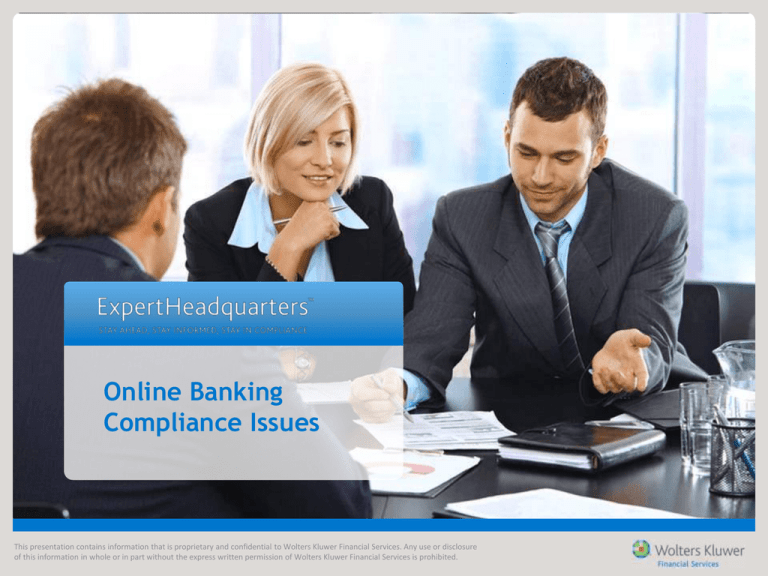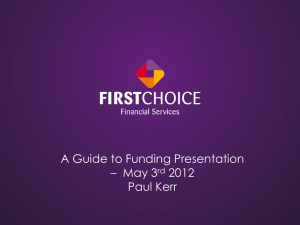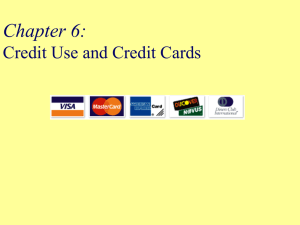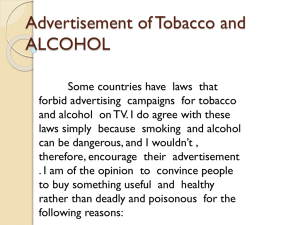Compliance Checklist Items - New Jersey Bank Marketing Association
advertisement

Online Banking Compliance Issues This presentation contains information that is proprietary and confidential to Wolters Kluwer Financial Services. Any use or disclosure of this information in whole or in part without the express written permission of Wolters Kluwer Financial 1Services is prohibited. Agenda Introduction Marketing Activities Regulatory Requirements – Advertising and marketing – Account opening Dealing with New Media 2 Introduction Two Ways to Say the Same Thing: If you’re in marketing or business lines: – You are in a REGULATED business. If you are in compliance: – You are in a regulated BUSINESS. Both are important! 3 Introduction: Definition of Advertising “Advertisement means a commercial message in any medium that promotes, directly or indirectly, a credit transaction.” 226.2(a)(2) Regulation Z “Advertisement means a commercial message, appearing in any medium, that promotes directly or indirectly the availability or terms of . . . .” 12 CFR 230.2(b) Regulation DD “The term “advertisement,” as used in this part, shall mean a commercial message, in any medium, that is designed to attract public attention or patronage to a product or business. 12 CFR 328.3(a) FDIC Rules 4 Typical Online Marketing Activities Website Banner ads Pop ups Weblinks Email solicitations 5 Marketing Activities: New Media The usual suspects - 6 Marketing Activities: New Media And then some . . . . 7 Typical Online Marketing and Compliance Management Involve Compliance early, strategically Work together to find solutions Use checklists Consider multiple sign offs Keep records Vendor management 8 Regulatory Requirements for Marketing and Advertising 9 1. 2. 3. 4. 5. 6. 7. 8. UDAP Membership/Logos Truth in Savings (Reg DD) Truth in Lending (Reg Z) COPPA CAN-SPAM ESIGN Account opening regs Unfair and Deceptive Acts and Practices Unfair: substantial injury to consumers which is not reasonably avoidable Deceptive: likely to mislead a consumer Consider the audience Accuracy, clarity, completeness 1. 2. 3. 4. Compliance Checklist Items: Who is the advertisement aimed at? Is the advertisement accurate? Is anything likely to mislead? Is anything missing? 10 Membership and Logos NCUA FDIC Equal Housing Lender and discrimination issues Exemptions Exceptions Non-compliance issues: corporate identity, branding 11 Membership and Logos: compliance checklist example 12 Truth in Savings/Regulation DD Purpose: to allow consumers to make comparisons between depository institutions Requirements: – Not misleading or inaccurate – When annual percentage yield stated, additional terms – Two decimal places – When bonus stated, additional info 13 Truth in Savings/Regulation DD Compliance Checklist Items: 1. Is the ad misleading or inaccurate? 2. Is the word “free” or similar words correctly? 2. Is a rate of return stated? If yes: Is the word “profit” NOT used in connection with the return? Is the rate stated as APY (with “annual percentage yield” spelled out at least once)? If interest rate is stated also, is it not more conspicuous than APY? If rate is variable, a statement that the rate may change after the account is opened. The time period the APY is offered or “accurate as of xx/xx/xx” statement. *Minimum balance required to get the APY. If tiering, minimum balance for tier (close proximity/equal prominence to APY) Minimum deposit to open the account if greater than minimum to earn APY Effect of fees statement (fees could reduce the earnings on the account). If a time account: * Term of the account Early withdrawal penalties * Required interest payouts (non-compounding , >1 year only) 3. Is a bonus stated? If so you need: *“annual percentage yield” * time requirement to get the bonus * minimum balance requirements to obtain minimum balance to open the account if greater than minimum to get APY when the bonus will be provided 4. Special media: if broadcast media (radio/television), outdoor media (billboards), telephone response machines, only need the items with an asterisk (*) above. 5. Indoor signs. If a rate of return is stated: “annual percentage yield” or APY No other rate of return stated except interest rate is permissible “Contact an employee for further information about fees and terms” statement 14 Truth in Savings – overdraft services Applies to ads promoting the payment of overdrafts Ads must have: – Fees for paying overdrafts – Categories of transactions for overdrafts – Repayment time period – When institution will NOT pay overdrafts 15 Truth in Savings – Overdraft services Compliance Checklist Overdraft services ads * fees for payment of overdrafts categories of transactions * time period consumer must repay or cover overdraft when institution will NOT pay overdraft communications about overdraft services that are exempt: ODP line of credit (Reg Z) Consumer-initiated inquiry (not through ATM, VRU or Internet) broadcast or electronic media (television or radio) outdoor media (billboards) ATM receipt in-person discussion disclosures required by law statement messages or notices deposit account agreement a notice that the transaction may trigger an overdraft fee (e.g., ATM) or general notice about overdrawing an account trigger fees educational materials that do not describe the institution’s overdraft service opt-out or opt-in notice regarding overdraft services. For ATM screens and VRUs need asterisk (*) items only Indoor signs for overdraft services need a statement that fees may apply and that consumers should contact an employee for more info 16 Nondeposit Investment Products Deposit insurance issues Clear and conspicuous disclosures – Not a deposit – Not insured – Not guaranteed Compliance Checklist Items: 1. Does the ad mislead regarding the risk of the product or whether the product is insured? 2. Are the required disclosures clear and conspicuous? – May go down in value Mixed product advertising Third party issues 17 Truth in Lending/Regulation Z Purpose – informed use of credit by consumers Open end vs. Closed end credit Dwelling secured, principal dwelling, not secured by dwelling Clear and Conspicuous – Equal prominence – Close proximity Can use representative samples Disclosures regarding taxes when loan exceeds FMV Special rules for web ads (catalog and multi-page ads) 18 Truth in Lending Banner ads and pop-up ads (links) exclusions – Home equity plans promotional rates and payments – Open end deferred interest (non-HELOC) – Closed end, dwelling secured loans rate info “Reasonably current index and margin” – dwelling secured loans – Email (within 30 days the ad is sent to the address) – Website (in effect when the consumer viewed them) 19 Truth in Lending – Web ads (“Multi-page or catalog ads”) Applies to catalog or other multi-page ads OR a website AND Gives information in a table or schedule AND Includes at least one triggering term Requirements to be considered a “single advertisement” 20 Truth in Lending – Closed End Checklist Compliance Checklist Items: 1. Is the loan product being advertised directed at consumers for personal, family or household purposes? 2. If a rate is stated, is it stated as an "annual percentage rate" using that term? 3. If a simple interest rate is also stated, is the corresponding "annual percentage rate" (APR) shown? 4. Is any other rate of finance charge used? 5. Are any trigger terms used? If so, are the following included? o Down payment amount or percentage in seller financing transactions o Repayment terms for full loan term, including balloon payment o “Annual percentage rate” or “APR” o Variable rate disclosure if the rate can increase after close o Radio/television ads: can list the big four above or include the annual percentage rate and toll-free number to obtain additional information 21 Truth in Lending – Closed End Checklist Continued Compliance Checklist Items: 1. Is the ad for a dwelling secured loan and other than television/ radio? If so: o Rates: is a simple interest rate is shown AND more than one rate applies over the term of the loan? If so, you need clearly and conspicuously(does not apply to envelope, banner ad or pop-up ad): • ACH simple annual rate. If variable, add index and margin (reasonably current) – equal prominence/close proximity to rate that triggered the disclosure • Period of time each simple annual rate applies– equal prominence/close proximity to rate that triggered the disclosure • Annual percentage rate– equal or greater prominence/close proximity to rate that triggered the disclosure o Payments: is payment info included? If so, you need clearly and conspicuously (does not apply to envelope, banner ad or pop-up ad): • Amount of each payment over the term of the loan. If variable, determine payment by adding index and margin (reasonably current) – equal prominence/close proximity to payment that triggered the disclosure • Period of time for each payment – equal prominence/close proximity to payment that triggered the disclosure • Is this a first lien loan? If yes, disclose that payments do not include amounts for taxes and insurance (if applicable) and that the actual payments will be greater o Is the ad for a principal dwelling secured loan AND that the loan may exceed the fair market value of the dwelling? If so, need both clearly and conspicuously: • Interest above the fair market value is not tax deductible for Federal taxes • Consult a tax advisor for more information 22 Truth in Lending – Closed End Checklist Prohibited Acts Compliance Checklist Items: For a dwelling-secured loan, are any of the prohibited acts in the ad? 1. Misleading advertising of fixed rates and payment. Is the word “fixed” used in ads for variable rate or stepped rate transactions? If yes: o Each use of “fixed” has the time period for the fixed rate or payment in equal prominence/close proximity o Disclose that the rate may vary or payment may increase after the “fixed” period o If you used the word “fixed” in an ad solely for a variable rate transaction: • Adjustable rate mortgage, variable rate mortgage, or ARM must appear before “fixed” and be at least as conspicuous o If you used the word “fixed” in an ad for both a variable rate non-variable rate transaction (e.g., stepped rate): • Adjustable rate mortgage, variable rate mortgage, or ARM must be with equal prominence as any “fixed” or similar term • Each use of “fixed” has the time period for the fixed rate or payment in equal prominence/close proximity 2. Misleading comparisons. Are payments or rates advertised for a period less than the full loan term? If yes, you need: o Rates and Payment information above o If variable rate, equal prominence/close proximity – subject to change and when the first change will happen 3. Misrepresentations about government endorsement. Does the ad claim that the product is part of a government loan program or similar when that is not true? 23 Truth in Lending – Closed End Checklist Continued Compliance Checklist Items: For a dwelling-secured loan, are any of the prohibited acts in the ad? 4. Misleading use of the current lender’s name. Are you using the name of the consumer’s current lender? If so, you need: o Your (creditor) name with equal prominence o Clear and conspicuous statement of no relationship with current lender 5. Misleading claims of debt elimination. Does the ad claim that the loan will eliminate debt (waiver, forgiveness) with another lender? 6. Misleading use of the term counselor. Does the ad use the term “counselor” in referring to anyone offering mortgage loans? 7. Misleading foreign language advertisements. Does the ad provide some triggers or required disclosures only in a foreign language and other disclosures only in English? 24 Truth in Lending – Open End Checklist Compliance Checklist Items: 1. Is the loan product being advertised directed at consumers for personal, family or household purposes? 2. Are any trigger terms used? If yes, need these: o Certain Finance charges (minimum, fixed, transaction, activity or other fee) o Periodic rate expressed as an annual percentage rate o Membership or participation fee If home equity plan, go to next slide 3. Is this an ad to finance the purchase of goods or services that states a periodic payment amount? If so, you need: o Total of all payments and time period based on the payment amount in equal prominence to the stated payment amount. 4. Are promotional rates (introductory rates) used (non home secured)? If so, need these clear and conspicuous in a prominent location closely proximate to first listing of the rate: o When the promotional rate ends o The APR that applies after the end of the promotional period 5. Is deferred interest used? If so: If “no interest” or similar term is used “if paid in full” also needed before disclosing deferred interest period o Terms of the deferred interest (Appendix G, Sample G-24 statements for credit card, other open end) o Interest will be charged from the transaction date if not paid in full by end of deferred period 25 Truth in Lending – Open End Checklist – home equity 1. Additional disclosures for a trigger term: o Any loan fee that is a % of the limit o Estimate of any other fees for opening the plan ($ amount or range) o Annual percentage rate o APR ceiling o If an initial rate not based on index/margin, need these with equal prominence and close proximity: • Time initial rate is in effect • Reasonably current APR based on index/margin o If a minimum periodic payment is mentioned AND a balloon payment MAY be possible based on making only the minimum payment, state that fact with equal prominence /close proximity to the payment. o If a minimum periodic payment is mentioned AND a balloon payment WILL occur based on making only the minimum payment, state that fact with equal prominence/close proximity to the payment amount AND the amount and timing of the balloon payment o Is the ad for a loan amount that may exceed the fair market value of the dwelling? If so, need both: • Interest above the fair market value is not tax deductible for Federal taxes • Consult a tax advisor for more information o Does the ad refrain from using misleading terms such as “free money?” o Are promotional rates and payments used? If yes you need these, clear and conspicuous, equal prominence, close proximity: • Period of time promotional rate or payment applies • APR • Amounts and time periods of payments • For radio or television can alternatively provide toll free number for consumers to get costs 26 COPPA Children’s Online Privacy Protection Act (COPPA) Aimed to protect children Regulate how information is collected Requires parental consent Compliance Checklist Items: 1. Do you have a content on your website directed at children under 13? 2. Are you collecting personal information from children under the 13? 3. If so, are you first obtaining verifiable parental consent as defined by the FTC? 27 CANSPAM Controlling the Assault of Non-Solicited Pornography and Marketing Act of 2003 No false or misleading transmission information – subject heading – who the message is from Identify the message as an ad Functioning e-mail return address AND physical address Clear and conspicuous notice opt out (10 business days) Requires the message to include a valid physical postal address of the sender Exemption for customer service 28 ESIGN and UETA Electronic Signatures in Global and National Commerce Act Affirmative and demonstrable consent Clear and conspicuous disclosures – Right to receive electronically – Right to revoke consent and procedures – Right to paper copy after consent (and any fees) Uniform Electronic Transactions Act (state law) – No preemption (additional state protections) 29 Other deposit account opening compliance issues Funds availability/Reg CC EFTA/Reg E Reg D – transfer limits Reg Q – interest on checking Privacy Online banking agreement 30 IT Concerns Information security (GLB concerns) Authentication Bandwidth Vendor management 31 Social Media: Risks and Opportunities Risks – Reputation – Compliance – Security Opportunities – New way of reaching customers – Cost-effective marketing channel – Innovation 32 Social Media Considerations Develop strategy – Goals – How to use – What to use Involve compliance early! Keep content updated 33 Social Media Considerations: Compliance Basic Risk Management – Guided from the Top – Risk Assessment – Policies and Procedures – Compliance Reviews and Monitoring – Vendor management – Training – Reporting 34 What’s coming up New regulations in 2010 – RESPA – Reg E – Reg Z (two final, two proposed, one interim) FCRA/FACT Act Dodd Frank Act – Agency structure – TILA/RESPA combined disclosure – Review of all regs – Fair lending – New rulemaking 35 Final Thoughts Keep big picture in mind Compliance is not business prevention Involve compliance early Work together to succeed in a competitive, heavily regulated business 36 How Can Wolters Kluwer Financial Services Assist You? Visit us at WoltersKluwerFS.com Contact your Wolters Kluwer Financial Services Inside Sales Representative for more information at 1.800.397.2341 37 Social Media Webinar – Available for Purchase On Demand Your 16 year old is on Twitter. And your Aunt Janet is on Facebook. What about your organization — should they be, too? This webinar is all about social media: the market opportunity, the basics of implementation, as well as the risks considerations about compliance. Our interactive marketing staff will join our compliance experts to help you see the big picture and get started implementing a social media plan that works for your organization. Hear more about: o The types of consumers who are using social media websites — and how they use them o The basics of getting your organization set up o The compliance implications — both internal and external — in communicating with your customers via this medium Join us for this timely, topical webinar on how to make social media work best for your bank. https://www.eventbuilder.com/wkfs/event_desc.asp?z=k9e1f8&p_event=7k7c7z69&gat eid=wkfs 38 Compliance Program Review http://www.wolterskluwerfs.com/banking /info/complianceconsulting/ 39 40 41 42 43







